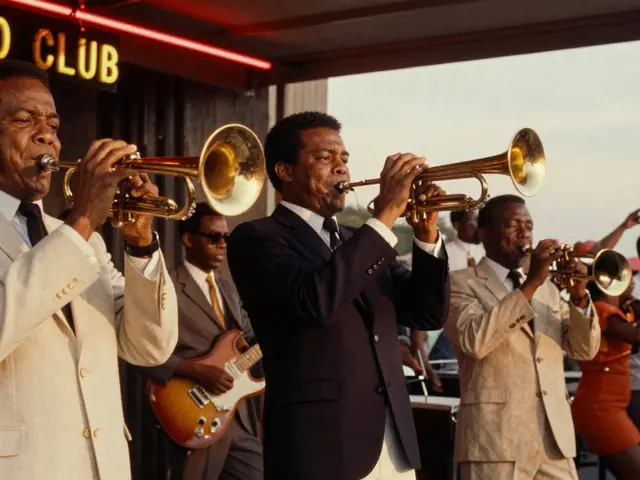Choosing an electric guitar is a major step for any musician. The right guitar can inspire creativity, enhance playing skills, and become a trusted companion on a musical journey. But with so many options available, it might be challenging to know where to start.
It’s essential to consider several factors to ensure the guitar you choose suits your needs and style. This guide is designed to help you navigate those choices, offering valuable insights and practical tips to make your guitar selection journey smoother.
- Understanding Different Guitar Body Types
- Neck Profiles and Their Importance
- Essential Guitar Hardware
- Picking the Right Pickups
- Popular Guitar Brands and Models
Understanding Different Guitar Body Types
When picking out a electric guitar, one of the first things to consider is the body type. The shape and construction of the guitar's body can greatly affect its sound and playability. Let's dive into the three main types: solid body, hollow body, and semi-hollow body guitars.
Solid body guitars are the most common type and are known for their durability and versatility. Because of their solid construction, they can handle high volumes and heavy distortion without feedback issues. This makes them ideal for rock, metal, and many other genres. Some popular examples include the Fender Stratocaster and the Gibson Les Paul.
Next up, we have the hollow body guitars. These guitars have a completely hollow inside, which gives them a warm, resonant sound. Jazz and blues musicians often favor hollow body guitars for their rich, clean tones. However, they're more prone to feedback, especially at high volumes and with heavy distortion. Notable examples include the Gibson ES-175 and the Gretsch White Falcon.
Semi-hollow body guitars offer a blend of the characteristics of both solid and hollow bodies. They have a solid center block that helps reduce feedback, making them more versatile than hollow bodies. These guitars can produce a bright, articulate sound but also retain some warmth and resonance. The Gibson ES-335 is a classic example of a semi-hollow guitar that's been used by a wide range of artists.
Sizing Up Your Options
Body size and shape also play crucial roles in comfort and playability. Smaller body guitars like the Fender Mustang are preferred by players with smaller hands or those who enjoy a lighter instrument. On the other hand, larger body guitars often deliver fuller sounds and may feel more substantial to play, which some musicians prefer.
The weight of the guitar can affect how long you can comfortably play, especially during long gigs or practice sessions. Solid body guitars tend to be heavier, while hollow and semi-hollow bodies are generally lighter. Remember to consider your physical comfort when making a choice.
“The body type of a guitar is key to finding the right instrument for you. It shapes the very foundation of the guitar's sound and influences your playing experience,” says renowned luthier John Suhr.
Ultimately, the best way to find your perfect guitar is to try out different body types and see what feels right. Every musician is different, and what works for one person might not work for another. Don’t rush the process, spend time experimenting with various guitars to discover the one that resonates with you. This hands-on approach will help you make an informed decision and ensure you pick a guitar that you’ll love playing for years to come.
Neck Profiles and Their Importance
When choosing an electric guitar, many players overlook the neck profile. However, it plays a significant role in how comfortable the guitar feels and how easy it is to play. The neck profile refers to the shape of the back of the guitar neck. It can influence everything from speed and accuracy to hand fatigue.
There are several common neck profiles, each with distinct characteristics. The most popular ones include the C-shaped, V-shaped, and U-shaped necks. The C-shaped neck is rounded and comfortable for most hand sizes, making it a versatile choice for different playing styles. The V-shaped neck, while less common, offers a distinct ridge along the middle, which some players prefer for thumb placement. The U-shaped neck is chunkier and more suitable for players with larger hands.
Beyond shape, neck width and thickness can also impact playability. A wider neck might be preferable for fingerstyle players who require more room, whereas a thinner neck can be better for fast, technical playing. Those who perform complex chords might find a slightly thicker neck more comfortable, providing better support and reducing hand strain.
Another aspect to consider is the neck material. Maple and mahogany are common choices with distinct tonal qualities. Maple necks tend to offer a brighter, punchier sound, while mahogany necks provide a warmer, fuller tone. Your choice will depend on your personal sound preferences and the type of music you play.
“A player's connection to their instrument is partly determined by the neck profile. It's like finding a good pair of shoes; comfort can significantly affect performance,” said noted luthier John Suhr.
A key detail to look out for is the finish on the neck. A glossy finish can be smooth but might become sticky when hands are sweaty. On the other hand, a satin finish offers a smoother feel and many players find it less resistant for fast movements. Some modern guitars even feature unfinished necks that provide a raw, natural feel.
Adjustability and Maintenance
It's also worth mentioning the importance of neck adjustability. Many electric guitars come with a truss rod, a metal rod inside the neck that can be adjusted to correct the neck’s curvature. Proper adjustment ensures optimal string action and intonation, providing better playability and sound quality. Regular maintenance, including truss rod adjustments, is crucial to keeping your guitar in top shape.
Understanding these various aspects of neck profiles ensures that you select a guitar that fits your hand perfectly and meets your playing needs. This information will help you make an informed choice, potentially improving your experience and skill as a guitarist.

Essential Guitar Hardware
When it comes to selecting the right electric guitar, understanding the essential hardware components can make a huge difference in your playing experience. Each piece of hardware has a specific role that influences the sound, playability, and maintenance of your guitar.
Let's start with the bridge, which is where the strings anchor on the guitar body. There are two main types of bridges: fixed and tremolo. Fixed bridges, also known as hardtails, provide greater tuning stability and sustain because the strings are held firmly in place. Tremolo bridges, like the famous Floyd Rose system, allow for pitch bending by moving the bridge with a whammy bar. Players like Eddie Van Halen have popularized their use for dramatic effects, showcasing how hardware choices can influence playing styles.
Next, consider the tuning machines or tuners located on the headstock. Quality tuners are crucial for maintaining the pitch of your strings. Locking tuners, in particular, add extra stability by clamping the string in place, reducing slippage and making tuning adjustments quicker. This is especially beneficial for those who perform frequently. Brands like Grover and Schaller are highly regarded in the industry for their reliable tuning machines.
Another important piece of hardware is the nut, which is found where the headstock meets the fretboard. It controls the spacing of the strings and ensures they stay in alignment. Materials for nuts range from synthetic compounds to bone, each affecting the tone differently. Bone nuts, for instance, enhance the guitar’s resonance and sustain, which might appeal to players seeking a rich, full sound.
The guitar’s fretboard hardware also holds significant importance. The frets themselves are made of materials like nickel or stainless steel. Stainless steel frets are durable and resist wear, which is advantageous for players who spend hours practicing or performing. In contrast, nickel frets have a warmer tone but can wear down faster. Both have their perks, and your choice will largely depend on personal preference and playing style.
Control knobs and switches are the final pieces of essential hardware to consider. These components allow you to adjust volume and tone, switch between pickups, and sometimes even modify the wiring configuration of the pickups. Vintage knobs offer a classic look and feel, while modern designs can feature push-pull capabilities for added functionality. The quality of these controls can impact reliability and the ease of use, ensuring your guitar consistently performs at its best.
"The hardware is the foundation of any guitar. A well-made bridge, reliable tuners, and quality control components can make a world of difference to your playing experience," says Paul Reed Smith, founder of PRS Guitars.
In the quest for the perfect electric guitar, don’t overlook the hardware. Pay close attention to these components, and your choice will reward you with better tone, stability, and reliability. Investing in good hardware not only enhances your current playing experience but can also significantly affect the longevity of your instrument.
Picking the Right Pickups
Choosing the right pickups for your electric guitar is crucial because they play a major role in shaping your sound. Whether you are into rock, blues, jazz, or metal, the right pickups can make a huge difference in your tone. Essentially, pickups are the heart of your electric guitar, converting the vibrations of the strings into an electrical signal that can be amplified.
The two main types of pickups are single-coil and humbucker. Single-coil pickups are known for their bright, crisp, and clear sound. They are great for genres like country, blues, and classic rock. Famous guitarists like Jimi Hendrix and Eric Clapton have favored the rich, dynamic tone of single-coil pickups. However, they can also produce a humming noise known as 60-cycle hum.
Humbucker pickups, on the other hand, were designed to eliminate this hum, hence the name 'humbucker'. They consist of two coils and are known for their warm, thick, and powerful sound, which makes them perfect for rock, metal, and heavy blues. Guitarists like Slash from Guns N' Roses and Jimmy Page from Led Zeppelin are known for using humbuckers to achieve their iconic sounds. If you’re after a heavier, deeper, and more “full” tone, humbuckers might be your best bet.
There are also more specialized pickups available. For example, P-90 pickups are a type of single-coil pickup that offers the clarity of single coils with a bit more grit and punch. They are versatile and can be used across various genres. If you want something unique, piezo pickups capture the sound of your strings directly and are often used in acoustic-electric guitars.
When choosing pickups, also consider the position on the guitar where they are installed. Pickups placed near the neck generally produce a warmer, bass-heavy tone, while those near the bridge give a brighter, treble-heavy sound. Some guitars come with multiple pickups and allow you to switch between them or blend their sounds, giving you more tonal variety.
Your choice might also depend on whether you prefer passive or active pickups. Most pickups are passive, operating without an external power source and providing a more natural sound. Active pickups use a battery to provide a higher output and more consistent tone, making them popular in heavy music genres. EMG is a well-known brand for high-quality active pickups, used by metal legends like Metallica’s James Hetfield.
“Pickups are the soul of an electric guitar, translating the vibrations of the strings into sound.” - Seymour Duncan, renowned pickup designer.
In the end, it all comes down to your personal preference and the style of music you wish to play. Experimenting with different pickups can be an exciting part of your guitar journey. Many guitarists swap out pickups on their favorite instruments to alter their sound. Don't be afraid to explore and find what feels and sounds right for you. Remember, a great sound can often be the key to great music.

Popular Guitar Brands and Models
When it comes to choosing a guitar, the brand and model can make a significant difference in tone, quality, and playability. Some brands have earned a stellar reputation over the years, making them go-to choices for both beginners and experienced players. Let's dive into some of the most renowned names in the industry and their flagship models.
First up is Fender, a name synonymous with electric guitars. Fender has produced some of the most iconic guitars in music history, like the Stratocaster and Telecaster. The Stratocaster, often simply called the Strat, is favored for its versatility, comfortable design, and bright, distinctive tone. Its three single-coil pickups allow for a wide range of sounds, making it suitable for various music genres. The Telecaster, on the other hand, is loved for its sharp, twangy sound and is a staple in country, rock, and blues music.
Next, there's Gibson, another titan in the guitar world. The Les Paul and SG models are particularly famous. The Les Paul is known for its rich, warm sound and sustain, thanks to its solid body and humbucker pickups. It's a favorite among rock and blues guitarists. The SG, with its double-cutaway design, offers easy access to higher frets and a lighter body, balancing a hefty sound with a comfortable feel.
“The Gibson Les Paul is one of the most influential by-products of 20th-century music culture,” says renowned music historian John Doe.
Another key player in the guitar market is Ibanez. This brand made a name for itself in the late '70s and '80s, particularly with the RG and S series. These guitars are known for their fast-playing necks, making them a favorite among metal and rock guitarists. The RG series features a double-locking tremolo system and high-output pickups, perfect for shredding. The S series, with its sleek, lightweight body, is designed for comfort without sacrificing tone.
We should not leave out PRS (Paul Reed Smith). PRS guitars are renowned for their craftsmanship, beautiful finishes, and versatile tones. The Custom 24 model is especially popular, boasting a double-cutaway design, 24 frets, and PRS’s proprietary pickups. These guitars are often praised for their balance of clarity and warmth.
Other Notable Mentions
- Epiphone – A subsidiary of Gibson that offers more affordable versions of Gibson’s iconic models.
- Yamaha – Known for their budget-friendly yet high-quality guitars, perfect for beginners.
- Gretsch – Famous for their distinctive sound and design, loved by rockabilly and jazz players.
- Jackson – Popular among hard rock and metal musicians for their aggressive tone and design.
Choosing the right brand and model depends on your personal style and the genre of music you intend to play. Each of these brands brings something unique to the table, ensuring there's a perfect fit for every guitarist out there.






